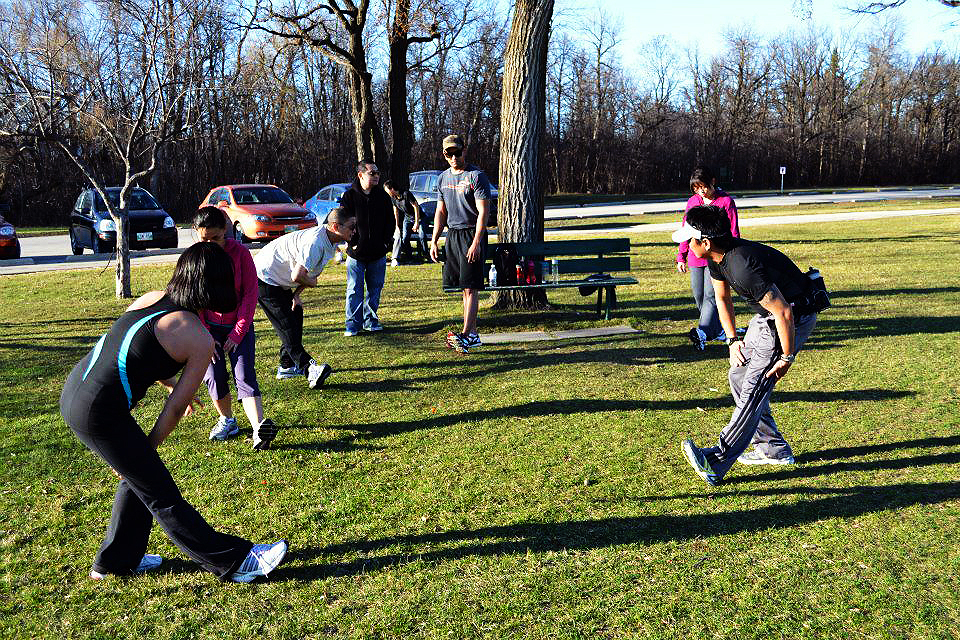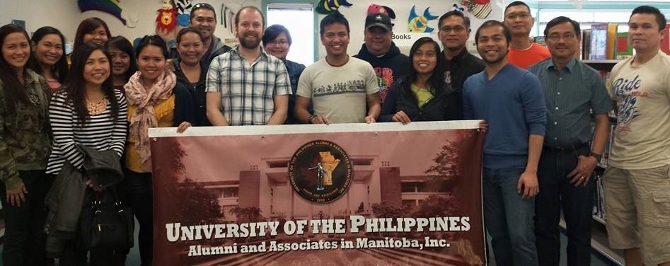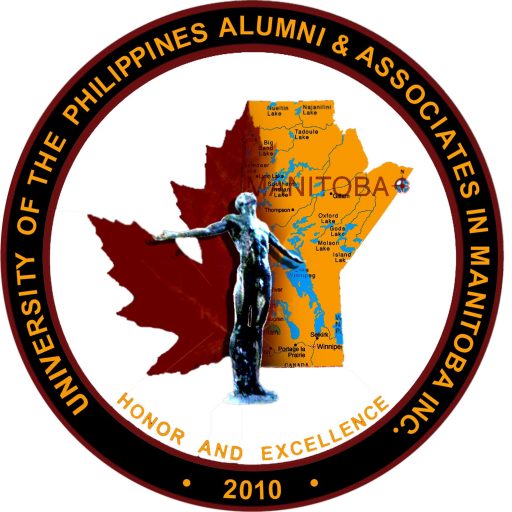UP Alumni & Associates in Manitoba, Inc.
A resource website for Filipino immigrants and University of the Philippines Systems Alumni in Manitoba
The pathway to being a professional agrologist in Manitoba
This article features the journey of two Filipino immigrants who studied agriculture at the same university and crossed each other’s paths as they pursued their dream to become Professional Agrologists in Manitoba. It tells about their unique experiences, the challenges and opportunities that came their way and their desire to make a difference in their chosen profession and in their new home province.
By: Ramon Faustino M. Sales, Jr.
The past decade has witnessed an increasing influx of immigrants from the Philippines and other countries who have resettled in Manitoba to seek a better quality of life. Many of them are professionals from various fields of expertise. Having a vibrant and fast-evolving agriculture industry, Manitoba offers plentiful opportunities for agrologists (or agriculturists as they are called in the Philippines) and other workers serving in this sector.
Among these foreign-educated Agrologists, Paulo Fabian and Jennifer Esquibel-Merin had, even before coming to Manitoba, set their sights on building a career in their field of study in their new home province. However, just like many other new immigrants in Manitoba, both of them were ready to take on transition jobs, while exploring opportunities to practice their profession.
A native of Sta. Maria, Bulacan, Paulo finished his Bachelor of Science degree in Agriculture, major in Horticulture, in 2002 at the University of the Philippines-Los Banos (UPLB). Prior to migrating to Winnipeg, Manitoba in 2008, he had worked for about four years in the private sector, three years of which dealt with veterinary product sales and landscape nursery establishment.
In Manitoba, Paulo first attended a pre-employment training program at Employment Solutions for Immigrant Youth, an agency that helps equip the youth with useful tools to find and keep job opportunities. Through this agency, he got a part-time job at a call centre and also obtained information about the agrology profession in Manitoba.
Jennifer, who hails from Liliw, Laguna, graduated with a Bachelor of Science degree in Agricultural Economics in 2005 also at UPLB. She could have opted to build a promising career at the Philippine government’s Department of Agriculture where she worked as a Project Development Officer for over two years, but fate had something else in store for her. Just like Paulo, when she arrived in Winnipeg in 2009, she took on jobs at Staples and Arts and Crafts, while actively seeking to get her credentials assessed and recognized.
Getting past the first hurdle
Had it not been for their common desire to practise their profession in Manitoba, Paulo and Jennifer would not have crossed each other’s paths. They both knew at the outset that the practice of the agrology profession in Manitoba is regulated by the Manitoba Institute of Agrologists (MIA) as enshrined in Manitoba’s Agrology Act.
Not too long after they submitted their professional certification application, Paulo and Jennifer got their much-awaited response from MIA informing them of their acceptance to a professional program for agrologists. In Manitoba, agrologists are trained and qualified to provide advice to production, processing and marketing of agricultural products, crops and/or livestock.
As outlined by MIA, the process for Professional Agrologist designation consists of five steps:
Step 1: Submission of application form for registration with reference letter from a professional
and payment of required fees
Step 2: Preliminary review of application by MIA. This process includes the review of application
by the World Education Services (WES) which is based in Ontario.
Step 3: Assessment of application by the Admission and Registration Committee (ARC)
Step 4: Decision on the application by ARC. If the application is approved, the applicant is then
registered as Agrologist-In-Training (AIT)
Step 5: Fulfillment of requirements to gain full status as Professional Agrologist (P.Ag.) or
Technical Agrologist (Tech. Ag.)
(More information can be obtained at this link: http://mia.mb.ca/process_overview.aspx )
The IEAP Program
The Internationally-Educated Agrologists Program (IEAP) is a skill-bridging program tailored for foreign –trained agrologists to enable them to integrate into the Manitoba agriculture sector, through a one-year program of coursework and work experience. It assists new Manitobans with a degree in agriculture in finding relevant work that matches with their skills and experience, while helping Manitoba’s agriculture industry search for new talent.
Eight-month Course Work
Under the IEAP program, the participants, who are registered as Agrologists-In –Training (AIT) upon acceptance to the program, are expected to demonstrate and confirm their technical and professional competencies in the Canadian context. The program coursework consists of 8-9 subjects related to the participants’ areas of knowledge and expertise and cover Canadian agricultural business, agricultural science, and production and management practices. The participants are enrolled in courses in the Faculty of Agricultural and Food sciences at the University of Manitoba.
In addition, participants take up a “Business and Technical Communication” course to enhance their communication and language skills and the “Practising the Profession of Agrology” course to equip them with the know-how about the agriculture industry and the responsibilities of a practising agrologist.
The IEAP course work runs annually between August and April of the following year. (To obtain more information about the IEA Program, follow this link: http://iep.mia.mb.ca/start-here/the-system/)
The first five batches of this program benefited from the full funding support provided by the Manitoba Labour and Immigration, which included a monthly allowance for participants during the entire course work. Program participants came from different countries such as Nigeria, Kenya, Sri Lanka, Eritrea and the Philippines.
Paulo and Jennifer belonged to the second (2008) and fourth (2010) batches of the program, respectively. Interesting as it was, the program not only allowed the participants to share technical know-how but also to promote meaningful cultural exchanges among them.
Four-month Cooperative Work Experience
Upon satisfactory completion of the coursework, the IEAP participants are required to undertake a four-month cooperative (or co-op) work experience to allow them to apply their newly- acquired knowledge and skills in a Manitoba agricultural firm, which many employers look for. The participants have to identify and explore possibilities with any firm for a paid work placement, which takes place from May to August.
In May 2009, Paulo got placed at the Ian N. Morrison Research Centre in the University of Manitoba in Carman, which he completed in September of that same year. To Paulo, his practicum work proved to be enriching as he honed his skills in conducting interviews with researchers and farmers and from recording field trials of new crop varieties and technologies, including driving a tractor, calibrating equipment, and mixing chemicals, among others. At the end of the co-op work, he put together a written report describing the methods, outcomes and the learning experiences he gained from it.
For Jennifer, it was a great feeling to have been accepted at MIA to provide human resource assistance to its Admission and Registration Committee in the review and processing of registration applications for the agrology profession. Little did she know that this practicum work would someday serve her well in her present job.
As they finished the co-op work, Paulo and Jennifer were well on their way to Professional Agrologist status.
To obtain a full professional status, Agrologists-In-Training need to fulfill additional requirements set by MIA as part of continuing professional development. These include attendance to the MIA annual general meeting and the MIA Professionalism and Ethics seminar. A total of 20 professional credits is needed to meet such requirements, and a whole day seminar is equivalent to 4 credit points. As well, they need to participate in the certification and mentorship process, and pay the required fees. (Additional information on the requirements can be obtained at this link: http://mia.mb.ca/requirements.aspx)
Having successfully completed their one-year program in 2009 and 2012, respectively, Paulo and Jennifer had been granted by MIA their license to practice as Professional Agrologists in Manitoba.
Some Challenges
Both Paulo and Jennifer consider themselves fortunate, having finished the IEAP program with full financial support from the provincial government.
Although a modest stipend was provided throughout the coursework, some foreign-trained agrologists are hesitant to take advantage of the opportunity, thinking that it would be a big risk giving up their current jobs. For Paulo and Jennifer, getting into the program was well worth the risk.
Getting a 4-month work placement proved to be a challenge for some participants. In Jennifer’s case, it took her two months to find an agricultural company to work with, which caused some delay in completing her program. Getting the right fit between the participant’s area of expertise and interest and the agricultural company’s need was a major consideration.
Recently, however, some changes have been made to the program. Unlike in the previous years, IEAP incoming program participants will now have to cover their tuition fees and related costs up to $5,500.00, depending on the number of courses. However, they may be referred to potential sources of financial assistance.
Practising Professional Agrologists
Shortly after becoming a Professional Agrologist in 2009, Paulo got hired for a six month full-time job as a laboratory technician at the University of Manitoba Soil Science Department. His work involved the weekly collection of soil samples with animal manure that were analyzed to determine their chemical composition and their potential effects on the environment.
In June 2011, with the assistance of the Career Gateway Program of Manitoba Civil Service Commission, Paulo was employed as a Pesticide Assessment Officer by Manitoba Conservation. His work involved the provision of technical advice and assessment related to pesticide licensing and permits. Eight months later, Paulo got accepted at Manitoba Agriculture, Food and Rural Initiatives (MAFRI) to work as Acting Pesticide and Regulatory Specialist, based in Carman, Manitoba. This time, he engaged farmers and rural municipalities to educate and train them on pesticides licensing. As both jobs were term appointments, he juggled his government work with his second job at Air Canada, while seeking to balance work, family and life.
Jennifer now works half a week at the MAFRI Livestock Section providing administrative assistance and the other half with MIA where she continues to perform the responsibilities assigned to her during her co-op work. An interesting job opportunity came knocking at her door one day, but she had to decline it with a heavy heart as the position was based outside Winnipeg. Had she accepted, she would have been far away from her parents and brother who had recently arrived and joined her in Winnipeg.
For both of them, getting registered as Professional Agrologists has not only broadened their horizons, but also widened opportunities to meet potential employers looking for their newly-acquired expertise, and expanded their professional network.
Beyond the IEAP program, Paulo and Jennifer have also shared interests in social-oriented pursuits. As regular members of the University of Philippines Alumni and Associates in Manitoba, Inc. (UPAA-MB, Inc.), they value the strong sense of camaraderie and purpose that binds its members towards improving the welfare of the Filipino community in Manitoba.
Looking Ahead into the Future
Paulo, now a doting father to a 2-year old daughter and also expecting a second child soon, and Jennifer, who recently tied the knot, look forward to a stable and fulfilling career in government service. Both of them though are not closing the doors to the private sector where career development opportunities are equally rewarding. Buoyed by her recent success, Jennifer plans to take up a masteral degree program in the near future, but she is fervently wishing her husband in the Philippines could join her soon so they could live and build a family together.
As to their words of advice to aspiring Professional Agrologists, they candidly admitted that hard work, determination, focus and giving one’s best are key ingredients to achieving that goal. The path to a promising future may be long and filled with bumps, twists and turns, but for these two U.P. alumni, getting their full professional status is indeed a big step forward in the right direction.





